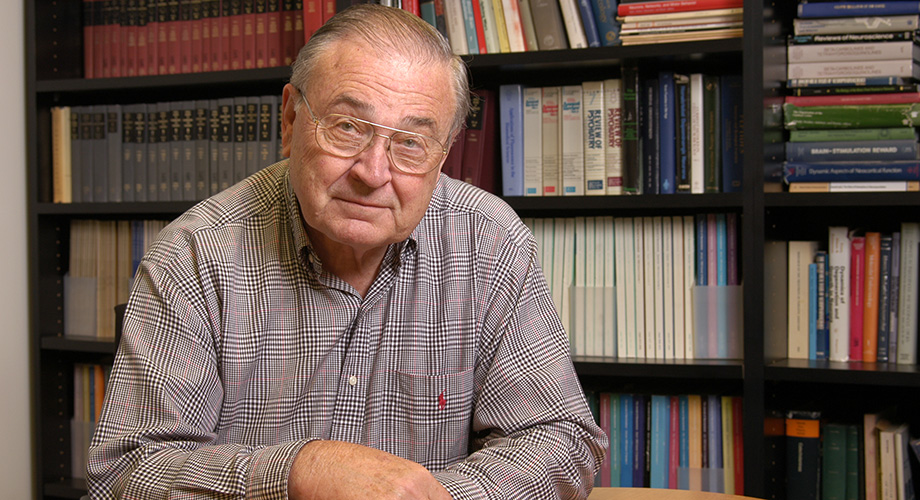
Thomas Scott Edgington – Polymath, Colleague, Mentor, Friend
March 02, 2021
Written by Francis V. Chisari, MD and Michael B.A. Oldstone, MD
Thomas Edgington, an outstanding scientist and a world leader in the field of vascular biology, passed away Jan. 22, 2021, just 19 days before his 89th birthday. An Emeritus Professor in the Department of Immunology and Microbiology, he spent 55 years during his career at The Scripps Research Institute (TSRI) and its precursor, The Scripps Clinic and Research Foundation.
Edgington joined TSRI as a postdoctoral fellow in 1965 to study immunology and immunopathology under Frank J. Dixon, MD, the founder of the institute and a giant in those fields. He was the most unusual of Dixon’s postdoctoral fellows in that he resigned his tenured faculty position at UCLA and returned his two NIH grants in order to do full-time research as a postdoctoral fellow in what was arguably the premier immunology institute in the world at the time.
Edgington was a pioneer. He introduced the first fraction collector at TSRI and one of the first FACS machines. For several years, he served as chairman of the Department of Pathology at Scripps Clinic while also directing his basic research laboratory at TSRI. He formed a vascular-biology unit, drawing members from several TSRI departments who, collectively, generated a mountain of highly original and fundamentally important observations over the years.
He was adventurous. He brought insatiable curiosity and energy to everything he did from mechanical engineering to radiation biology, from human pathology to cancer diagnosis, from protein-protein recognition to immunology, virology, lipoprotein biology and his favorite topic, the molecular basis for blood coagulation. He was the founder of three biotechnology ventures and sat on the boards of many others.
He was a teacher and a role model who trained a large cadre of postdoctoral fellows who are now in leadership roles in all of the abovementioned disciplines all over the world.
Edgington liked to talk. He couldn’t say ‘hello’ in fewer than 10 minutes. He was a storyteller. He loved to tell his postdocs who complained about struggling to get an experiment to work that, when he was a postdoc, he had to chase sheep and goats around an East County farm. This was in order to catch, immunize and eventually collect blood samples so he could isolate, purify and fluoresceinate or radiolabel the antibodies he needed to perform the homegrown immunoassays that he created to do his research. He did it all with a twinkle in his eye.
Arguably, Edgington’s greatest scientific achievement was the cloning of tissue factor and identifying the specific pathways it regulates in the coagulation system, which earned him a bevy of national and international awards, including the Presidency of the Federation of American Societies for Experimental Biology (FASEB) and election into the Institute of Medicine of the National Academy of Sciences, now known as the National Academy of Medicine. His commitment to full-time basic scientific research, the training of dozens of research fellows, and his collegiality with scientific colleagues and competitors alike was legendary.
Edgington was a fourth-generation Californian, a hard-working only child of hard-working parents. His intellect, engineering skills and academic achievements were rewarded by recruitment to Stanford University for his undergraduate and medical studies. After graduation, he worked on an early form of the heart-lung machine at the University of Pennsylvania. After postgraduate training in Pathology at UCLA, he joined the faculty as Director of Clinical Pathology and became a member of the Atomic Bomb Casualty Commission studying the long-term impact of radiation on survivors of the atomic bomb.
Edgington’s first wife and the mother of his children, Joanne Edgington, predeceased him after 50 years of marriage. He is survived by his daughter Kassy Perry, a life sciences public relations consultant; son Scott Edgington, a businessman; four grandchildren; and second wife Sandra Edgington.
Edgington loved life and lived it well. He will live long in the minds and hearts of his family, his many friends and colleagues, and the more than 70 postdoctoral fellows he trained.
For more information, contact press@scripps.edu

